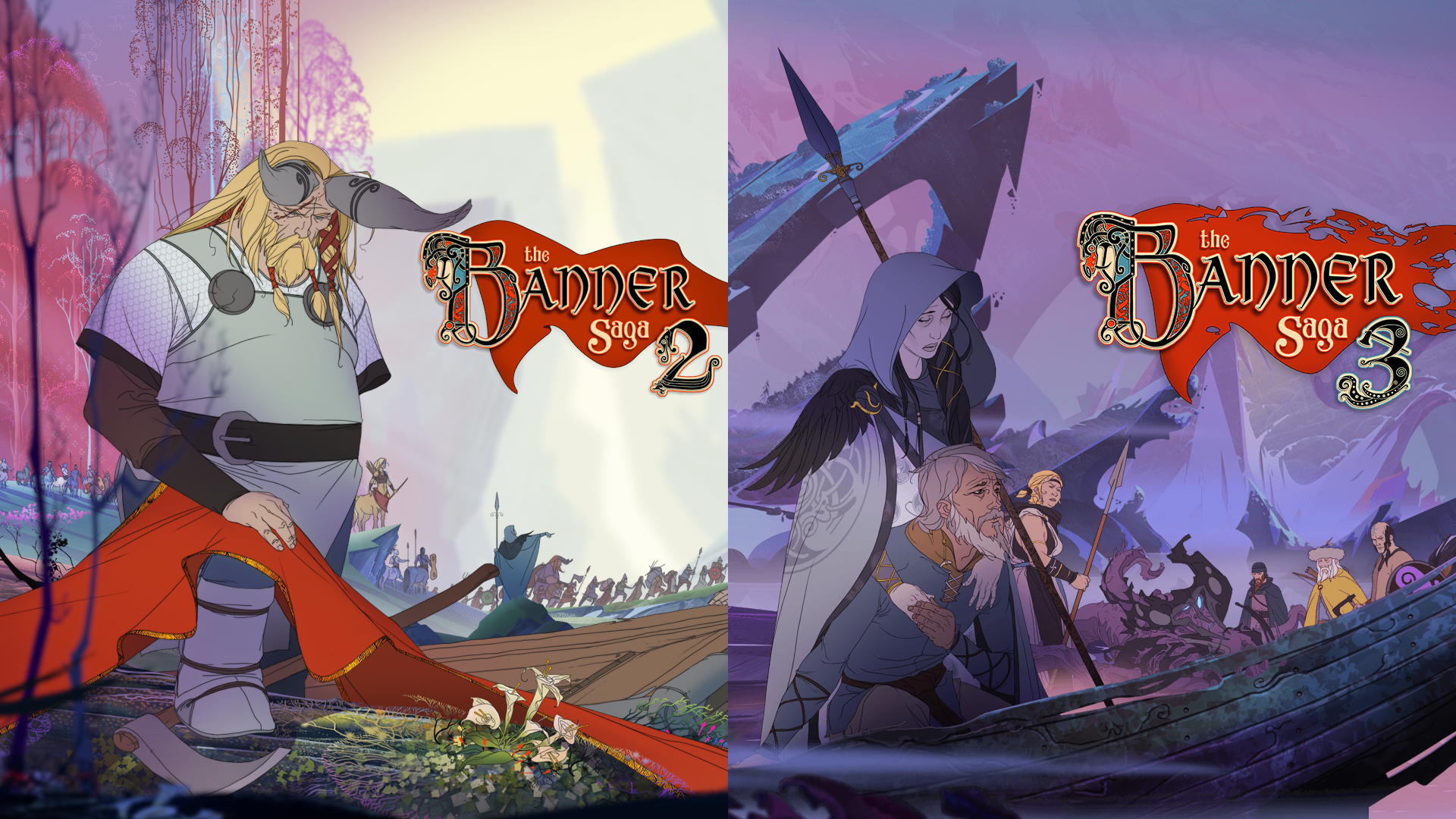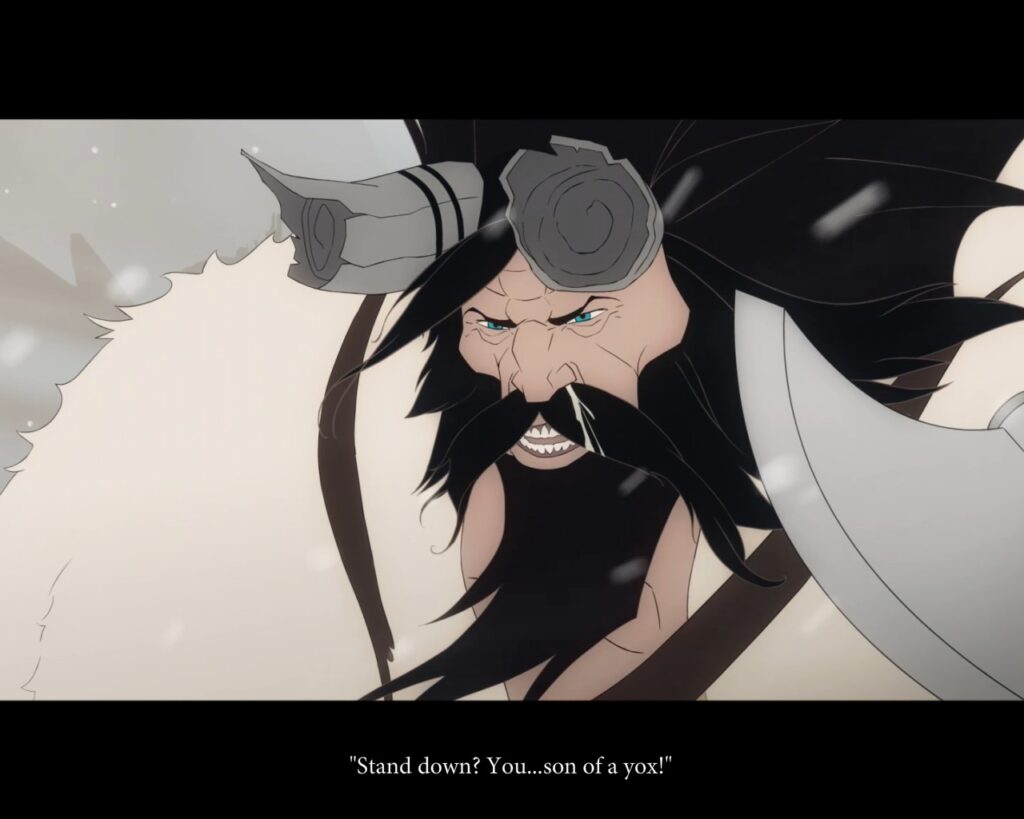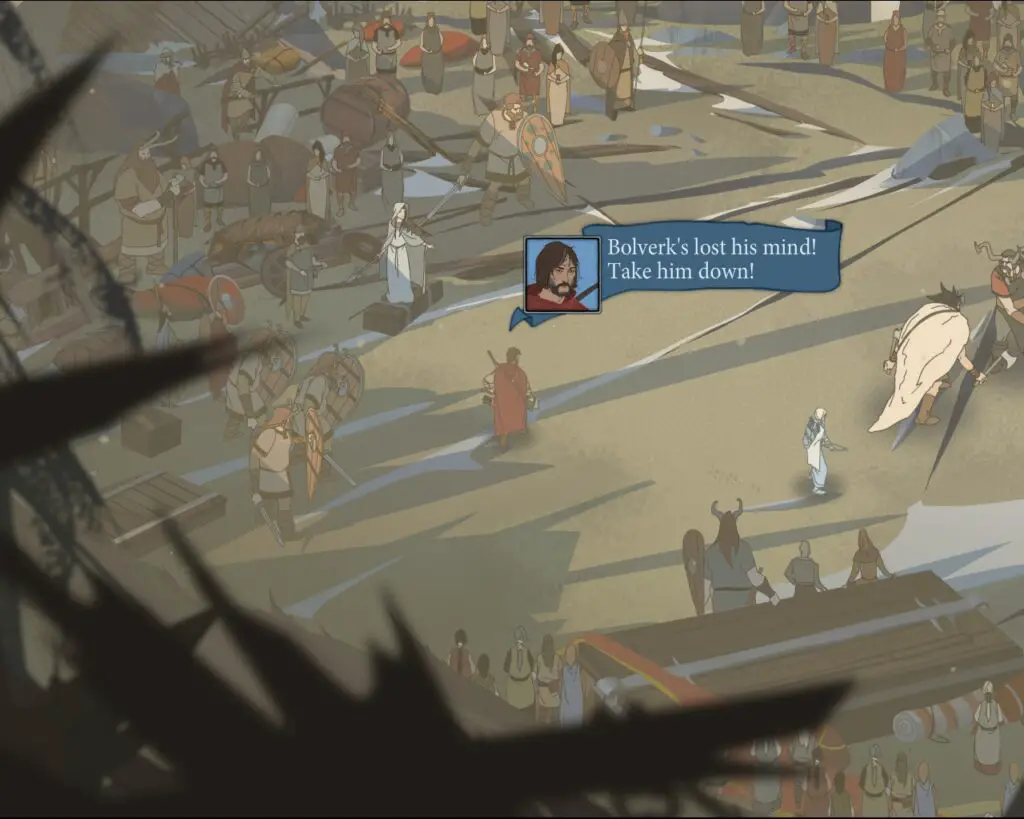I’m going to review both The Banner Saga 2 and The Banner Saga 3 together in a similar way I reviewed all BattleTech DLCs from Season Pass. In my opinion, it would be most fair to consider both games as add-ons to The Banner Saga.
Granted, The Banner Saga 2 and 3 have some gameplay enhancements over the first game but no more than would be expected from the good expansion. And while you still can buy all three separately, I wouldn’t recommend anyone to start playing sequels without finishing the original. It’s like starting to read a book or watch a movie skipping the entire first act.
The Story Goes So Far…
For the reason above I’ll try not to spoil the first game too much. But several key points you should know anyway:
The world of The Banner Saga is based on Norse mythology but has enough difference. Gods that created it are dead or at least rumored to be dead for quite some time. But their legacy remains in form of shrine-like Godstones… and several intelligent (well, more or less) races, whom gods created before perishing in a celestial war.
As the mythology goes, humans were created first by a supreme deity. And they actually doing well enough even now. They build cities, raise children, and even have their own mages, ‘menders’ who can weave spells and create various stuff.
Varl, horned giants were created by another god, who didn’t put enough thought into them. For one, varls can’t have any children, so even as they live for hundreds of years, they are doomed. Especially now, when a third race, created by most arrogant and wicked god, terrifying stone warriors Dredge came from underground to wage the last war.
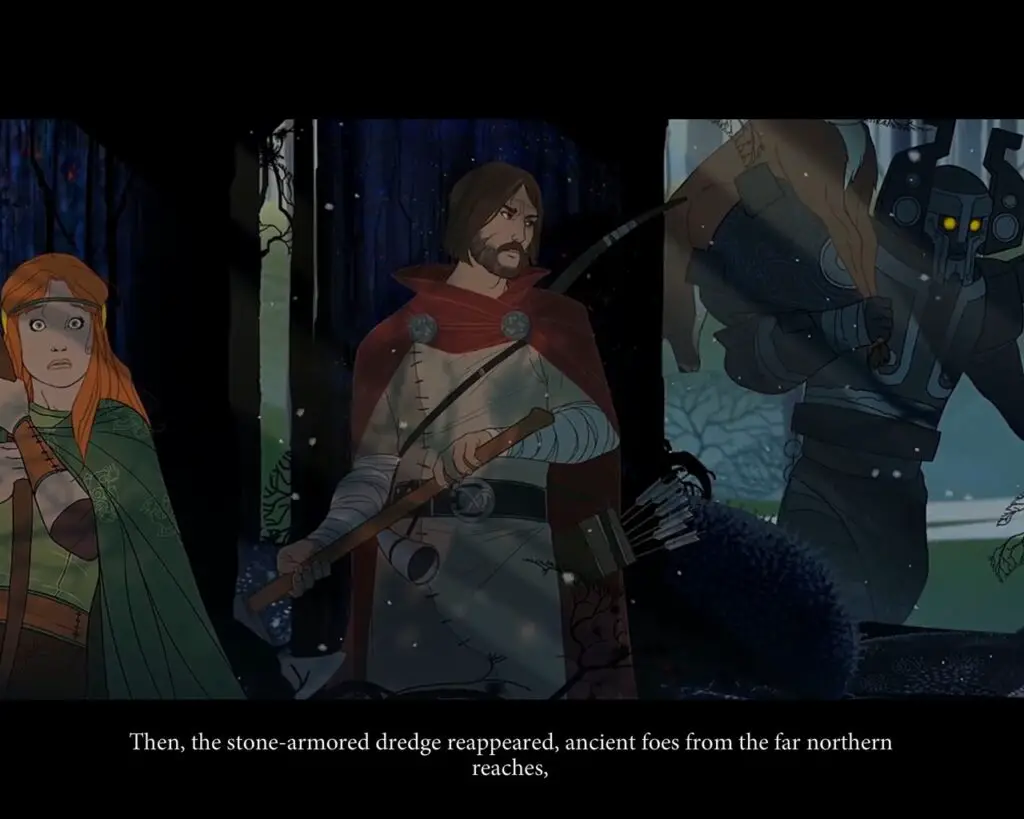
For the entire first game, you just ran from the Dredge. As well as from a giant serpent that destroyed entire mountains along its path. Food was scarce and good loyal fighters even more so. Yet your caravan managed to survive and even defeat one of Dredge’s leaders – “The Bellower”. If you finished the game successfully that is.
Now, however, you have a goal – reach human capital, Arberrang. There you’ll be able to defend human clans (as well as other peoples who join you) against dredge and later fight even more powerful, a true foe that is going to destroy the world, unless another group of survivors, lead by two mysterious menders, will be able to fix things. Somehow.
The Road (Not) Taken
Even as you start TBS2 leading a single caravan, it soon splits. So the story, like in the first game, will again jump at key plot events from one location to another. And more importantly from one POV character to another, because as a leader of a mercenary company you’ll have choices based on quite a different mindset than one of a peaceful caravan or a bodyguard for two menders, mentioned above. Morally dubious options for one can be reasonable choices that bring positive results for another.
As usual, making wrong decisions will cost lives, food, and sometimes even the main characters, who aren’t immune to death or leaving your caravan for various reasons. And you will need both food supplies to keep Morale high and characters be able to fight, as like in the previous game, your path will be filled with roaming bandits, Dredge armies, food shortage, and all sorts of trouble. Even as you reach the Arberrang at the end of the second game, in the third TBS you’ll have to deal with intrigue and disputes while trying to protect the city from outside and inside threats.
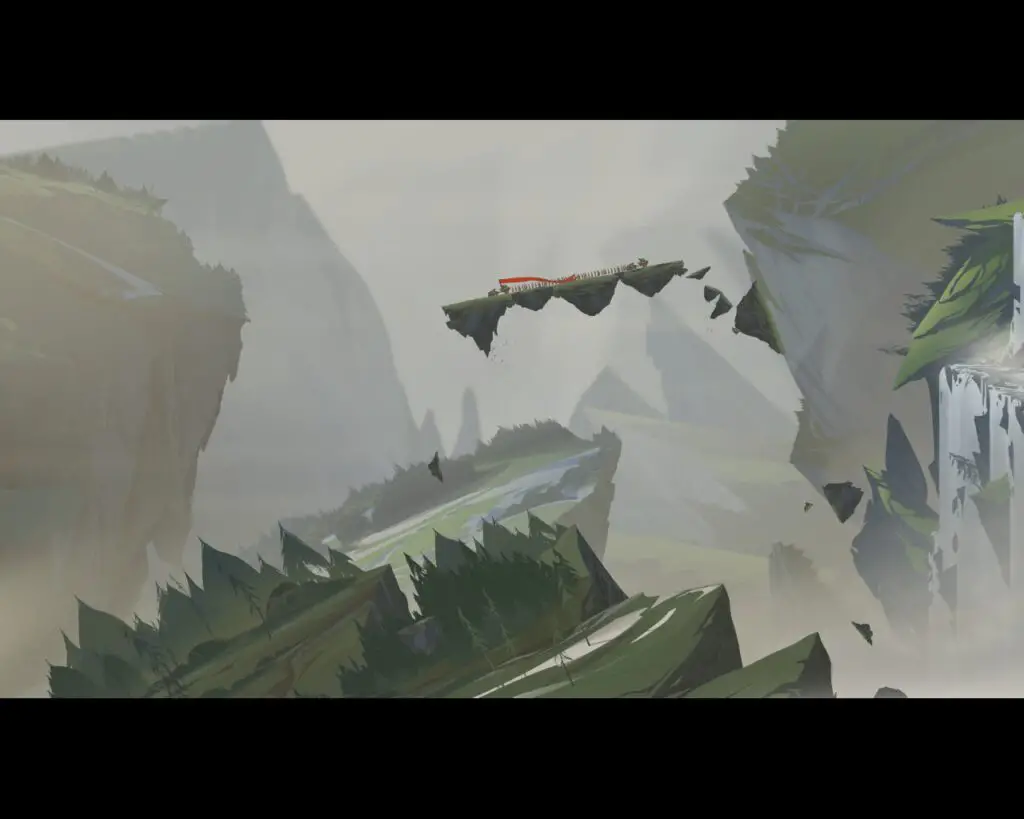
Good decisions will result in more food, fewer casualties, additional allies… Though of course not every consequence will be apparent immediately. And again my impression is that, if you play for the first time without a guide, some of the choices are more about guessing writers’ whims than applying rational deduction.
Though credit where credit is due. The story itself is captivating, characters are relatable, and deciding whom you side with, whom you risk losing is often about your own favorites as much as cold calculation of resources and fighting chances.
Combat Evolved
While core mechanics of turn-based combat remains the same, Stoic Studio definitely improved the battle experience by introducing new units, new abilities, and even additional character build options. The former includes a centaur-like horseborn with poison arrows, Bolwerk character, whose normal attack is always followed by a second strike hitting randomly friend or foe, a few menders with more magic abilities, and even a specially trained War Bear who absorbs Strength damage with Armor.
TBS2 introduces “talents” for each stat (Strength, Will, etc) that you can choose after reaching the stat’s cap. Armor and Will regeneration or bonus damage chance – every talent increases the character’s odds of surviving the fight. And in TBS3 upon reaching level 11 you can choose a Title for your character that adds another bonus. Of course, you need to spend Renown earned in battles on all of those.
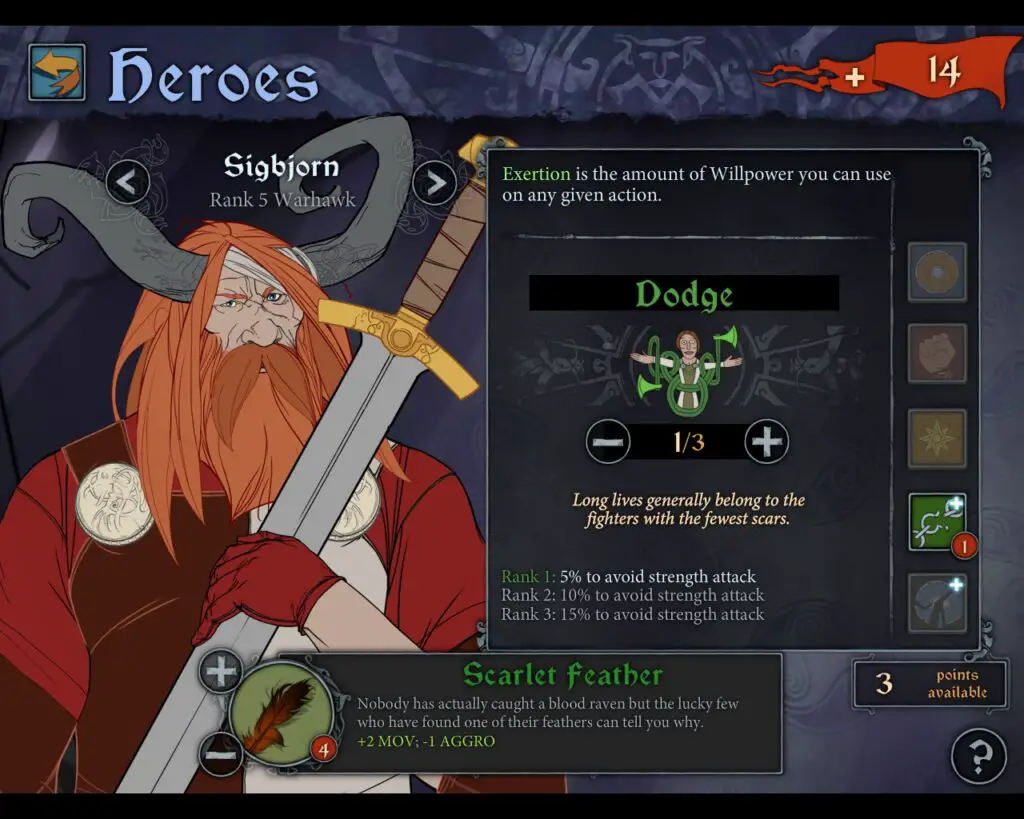
Battles themselves also became more diverse. There can now be obstacles that give you temporal protection from incoming enemies or hinder you, thus needed to be destroyed. In some fights, you just need to defeat enemy leaders to win. Sometimes there are side objectives (like to capture mentioned War Bear). And the third game even allows ‘reinforcements’, so you can change your wounded units for others in your roster between rounds of ‘war event’. You know, the ones that feature several waves of enemies. Except in the third TBS, those ‘waves’ have a turn counter on them, so don’t be slow if you want to have a moment of respite.
In case that wasn’t enough, Training Tent became more than just a sandbox to test your new units. There are several challenges in there that play a lot like chess problems (except with random factor) and grant more Renown and kill count for your units, allowing you extra chance to advance characters.
The Caravan is Still Going
Caravan management had also somewhat expanded. Now you can train ordinary clansmen into fighters that will reduce your losses in ‘war events’. However, be mindful that clansmen are also useful now – they forage food while you travel to Arberrang and help with resources while in the city walls.
Though as usual your calculations can be thrown in the gutter with another story event giving or taking a chunk of your supplies. Still, try to keep your fighters, clansmen, and food intact as towards the end of the third game every pair of hands will count – the more resources, workers, and warriors you’ll have in Arberrang, the more time another group will have to reach the goal and save everyone.
To be fair, if in the first and second games you fared well enough, in the third you can complete the final mission even before real trouble in Arberrang would start. Some players consider this a drawback as a good (and interesting) chunk of content is kept exactly from those who played the best.
But I personally think that developers made the right choice. There are too many stories with artificial drama as it is. The game about choice and consequence should reflect those choices and consequences properly, and that means being better prepared for the darkness ahead should result in having more time before you fall over the edge.
So instead of complaining, I would praise writers, who made content both for those who play well and those who didn’t. And since the existence of multiple endings wouldn’t be a spoiler to anyone, I also note that Banner Saga’s conclusion(s) being very satisfying. Unlike in some other games, different endings don’t feel like a botched “try better next time” runaround, but as a genuine closure, sometimes even with secret revelations.
Yox Effect
The trilogy is not without flaws, however. For one, there are quite a few bugs. Most infuriating for some players being story choices not transferring properly if you import saved games. Imagine being accused of doing a bad choice which you certainly didn’t do!
I was lucky enough not to stumble into that but I had another problem in TBS2 – my several horseborn characters lost their special abilities after promotion. Such a bummer, considering how useful poison strike was.
In addition to bugs, there are ambiguous choice descriptions that lead to frustrating results. One time I accidentally agreed to train more warriors and ended up with less than 50 clansmen who just couldn’t sustain caravan food supplies.

In combat, for all its improvements, devs didn’t do anything about the interface. If your unit has a ranged special ability, you wouldn’t see its range when previewing your movement unlike with normal attacks.
Song of Light and Darkness
You can say that all TBS problems mentioned above are minor. And you would be right! The game itself is great. It has a great story with memorable characters and plot twists. It offers a challenge and makes you really feel that your choices matter. There are eye-pleasing visuals, an immersive atmosphere, and I would even say – soul.
Speaking of visuals. The first game had to cut lots of corners due to a very tight budget but parts 2&3 now have fully animated cut-scenes as well as more voiced narration and dialogues. Also, designers found more creative ways to apply already existing ideas. Like some fights are now scripted the way to play like semi-controllable cut-scenes.
That’s why it’s so frustrating that this great game suffers from small (and in my opinion obvious) oversights. Sure, you can use guides to avoid misunderstandings and if you don’t like combat – turn the easiest difficulty. But that will remove the whole layer of the game.
But nevertheless, it’s still a great game. So, I do recommend The Banner Saga Trilogy to everyone who values good story, mixed genre games, and wants to support the indie scene in general.

